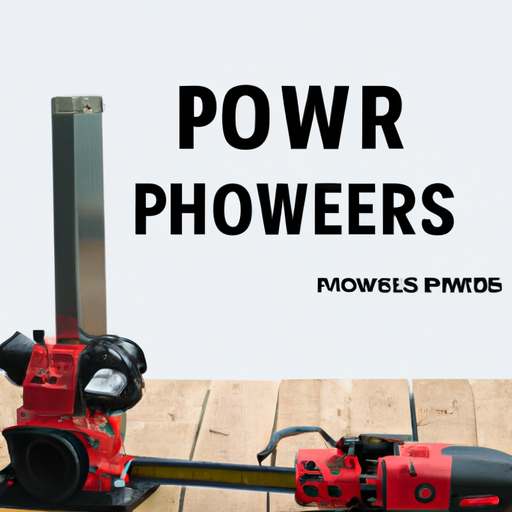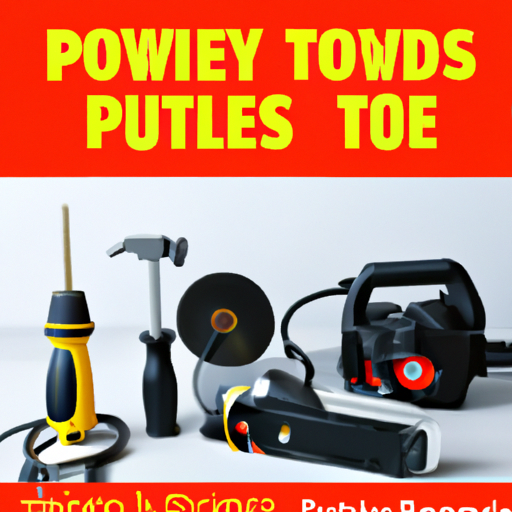If you’re ready to level up your DIY game and transform your home workshop into a bustling hub of creativity, then look no further than these incredible beginner-friendly power tools. Designed with simplicity and ease of use in mind, these tools are perfect for those just starting out on their DIY journey. From drills and saws to sanders and routers, these power tools will empower you to tackle any project with confidence, making your home workshop the envy of all your friends and neighbors. Get ready to unleash your inner handyman and take your DIY skills to new heights!
Drills
If you’re starting out with your own home workshop, a drill is an essential tool to have. Drills come in various types, but the two most common ones are cordless drills and hammer drills.
Cordless Drills
Cordless drills are incredibly convenient because they don’t require a power outlet. They are battery-powered, allowing you to move freely without worrying about cords and cables. Cordless drills are ideal for general drilling tasks like drilling into wood or metal. They come in different sizes, with varying power and speed options to suit your needs.
Hammer Drills
For more heavy-duty drilling tasks, consider a hammer drill. Hammer drills have a specific hammering action that helps them effortlessly penetrate harder materials like concrete or masonry. These drills are perfect for projects that require drilling into tough surfaces, such as installing shelves or hanging heavy mirrors.
Impact Drills
If you need a drill that combines drilling with increased torque and power, an impact drill is what you need. Impact drills are designed to provide extra force with each rotation, making them excellent for driving screws into harder materials. These drills are perfect for projects that involve heavy-duty screwing or fastening tasks.
Saws
Saws are another crucial tool to have in your home workshop. They come in various types, each specialized for different cutting applications. Here are three of the most common types of saws you should consider having in your collection.
Circular Saws
Circular saws are versatile and widely used in many woodworking projects. They have a round blade that spins rapidly to make smooth and precise cuts. Circular saws are great for cutting through materials such as plywood, lumber, or even metal. They are known for their ability to make straight and long cuts with ease.
Jigsaws
If you’re looking for a saw that excels in making intricate curved cuts and detailed designs, a jigsaw is the tool for you. Jigsaws have a small and thin blade that moves up and down rapidly, allowing you to maneuver and cut through materials with precision. They are perfect for projects like cutting out shapes, creating notches, or even trimming edges.
Miter Saws
For precise angle cuts, a miter saw is invaluable. These saws are designed to rotate and tilt, allowing you to make accurate cuts at various angles. Miter saws are commonly used for projects such as crown molding, picture frames, or any task that requires precise angled cuts. They provide stability and accuracy, making your woodworking projects easier and more professional-looking.

Sanders
To achieve a smooth and polished finish on your woodworking projects, sanding is a crucial step. Sanders help remove rough edges, imperfections, and old finishes, giving your workpieces a clean and even surface. There are different types of sanders available, but here are three of the most common ones used in home workshops.
Orbital Sanders
Orbital sanders are handheld sanders that utilize a random orbital motion to provide a swirl-free finish. They are ideal for smoothing and refining large surfaces, such as tabletops or cabinets. Orbital sanders are known for their ease of use and ability to smooth out rough patches without leaving marks or scars on the wood.
Belt Sanders
If you need to remove a significant amount of material quickly, a belt sander is the perfect tool for the job. Belt sanders have a continuous loop of sandpaper that moves rapidly, allowing you to strip off material with ease. They are excellent for rough sanding or leveling uneven surfaces, making them ideal for tasks like removing old paint or shaping wooden boards.
Random Orbital Sanders
Random orbital sanders are versatile tools that combine both the sanding action of an orbital sander and the material removal capability of a belt sander. These sanders use a circular motion while simultaneously vibrating, ensuring an even finish and preventing swirl marks on your workpiece. Random orbital sanders are perfect for both rough and fine sanding tasks.
Nail Guns
If you find yourself doing a lot of construction or woodworking projects that require fastening, a nail gun can be a game-changer. Nail guns are power tools that allow you to drive nails into various materials quickly and efficiently. Here are three types of nail guns commonly used in home workshops.
Brad Nailers
Brad nailers are lightweight and versatile nail guns that use small gauge nails called brads. These nails are thin and leave smaller holes, making them perfect for delicate projects like attaching trim or molding. Brad nailers are easy to control and are often used for finish carpentry work or crafts.
Finish Nailers
Finish nailers are slightly more robust than brad nailers and use slightly larger gauge nails. These nail guns are commonly used for tasks that require driving nails into thicker or denser materials, such as attaching baseboards or assembling furniture. Finish nailers provide a stronger bond compared to brad nailers and are suitable for a wide range of applications.
Framing Nailers
For heavy-duty construction projects like building a deck or framing a house, framing nailers are a must-have. These nail guns use large, thick nails and provide significant driving power to penetrate dense materials like lumber or hardwood. Framing nailers are designed for speed and efficiency, allowing you to work quickly and securely.

Power Screwdrivers
When it comes to driving screws into various materials, power screwdrivers are far more efficient and time-saving than manual screwdrivers. There are different types of power screwdrivers available, but two of the most common ones are cordless power screwdrivers and electric power screwdrivers.
Cordless Power Screwdrivers
Cordless power screwdrivers are lightweight and portable tools that are perfect for small projects or tasks that require mobility. They are battery-powered and allow you to work without the constraints of cords or cables. Cordless power screwdrivers are ideal for assembling furniture, installing shelves, or any DIY project that requires driving screws.
Electric Power Screwdrivers
Electric power screwdrivers are more powerful and suitable for larger projects that demand higher torque and speed. These screwdrivers are plugged into a power outlet and provide consistent power throughout your work. Electric power screwdrivers are excellent for heavy-duty tasks like building cabinets or constructing wooden structures.
Rotary Tools
Rotary tools are versatile and compact power tools that can handle a wide range of tasks in your home workshop. Whether you need to engrave, polish, grind, or cut, rotary tools can do it all. Here are three common types of rotary tools that are perfect for beginners.
Dremel Tools
Dremel tools are the most well-known brand of rotary tools available. They are compact, lightweight, and operate at high speeds, making them perfect for precision tasks like engraving, etching, or carving. Dremel tools come with a variety of attachments and accessories, allowing you to tackle various projects with ease.
Rotary Tool Kits
If you’re just starting with rotary tools, investing in a rotary tool kit is a great option. Rotary tool kits typically include the rotary tool itself along with a wide range of accessories and attachments. These kits give you the versatility to tackle multiple tasks, such as cutting, sanding, or polishing, without the need for additional purchases.
Engravers
Engraving is a creative and useful technique that can add a personal touch to your projects. Engravers are specialized rotary tools designed specifically for engraving on different materials like wood, metal, or plastic. These tools allow you to etch detailed designs, patterns, or even personalize your workpieces with initials or names.

Air Compressors
If you plan on using pneumatic tools in your workshop, an air compressor is a necessary investment. Air compressors provide the power and pressure needed to operate nail guns, paint sprayers, or pneumatic wrenches. Here are three types of air compressors commonly used in home workshops.
Pancake Air Compressors
Pancake air compressors are compact and portable, making them suitable for smaller workshops or projects that require mobility. These compressors get their name from their unique flat and round shape resembling a pancake. Pancake air compressors are perfect for tasks that require lower airflow, such as inflating tires or using smaller pneumatic tools.
Hot Dog Air Compressors
Hot dog air compressors are similar to pancake compressors in terms of portability but have a cylindrical tank shape. These compressors are slightly larger and provide more air capacity, making them ideal for medium-sized projects or tasks that require longer continuous operation. Hot dog air compressors are versatile and can handle a variety of pneumatic tools.
Vertical Air Compressors
Vertical air compressors are larger and designed for heavy-duty use in larger workshops or commercial settings. These compressors have a taller tank orientation, allowing for more air storage capacity. Vertical air compressors often have higher horsepower motors, providing increased airflow and pressure for demanding projects. They are excellent for continuous and intensive use.
Planers
Planers are essential tools for woodworking projects that involve shaping, smoothing, or resizing wooden boards. They excel in removing thin layers of material, resulting in a flat and even surface. Here are three types of planers commonly used in home workshops.
Benchtop Planers
Benchtop planers are compact and designed to sit on a workbench or table. They are perfect for hobbyists or DIYers with limited space. Benchtop planers can handle a range of woodworking tasks, from resizing boards to smoothing out rough surfaces. Despite their small size, benchtop planers offer high-quality results and precision control.
Handheld Planers
Handheld planers are portable and give you the freedom to work on larger or fixed objects. These planers are excellent for tasks such as planing doors or working on large tabletops. Handheld planers are lightweight and easy to maneuver, allowing you to shape or flatten surfaces with ease. They are perfect for both professional and home use.
Thickness Planers
If you frequently work with rough lumber or need to ensure consistent thickness in your woodworking projects, a thickness planer is a must-have tool. These planers are specifically designed to remove a consistent layer of material from the entire surface of a board, resulting in a uniform thickness. Thickness planers are ideal for creating uniform-sized pieces, such as flooring or furniture components.

Routers
Routers are versatile tools that can enhance the design and functionality of your woodworking projects. Whether you need to create decorative edges, joinery, or cutouts, routers can help you achieve professional-looking results. Here are three types of routers commonly used in home workshops.
Plunge Routers
Plunge routers allow you to plunge the bit into the material at any desired depth, making them perfect for tasks such as making inlays or creating dadoes. These routers are versatile and can handle both edge routing and plunge routing, giving you the flexibility to tackle various projects. Plunge routers are excellent for precise and controlled routing.
Fixed Base Routers
Fixed base routers are the most common type of routers used in woodworking. They are designed for edge routing and provide stability and accuracy during operation. Fixed base routers are perfect for tasks like creating decorative edges, cutting patterns, or trimming laminates. They are easy to control and suitable for both beginners and experienced woodworkers.
Combination Base Routers
Combination base routers, as the name suggests, combine the features of both plunge routers and fixed base routers. With a combination base router, you have the flexibility to switch between plunge and fixed base routing, allowing you to tackle a wide range of projects. These routers are versatile and best suited for woodworkers who require both types of routing capabilities.
Heat Guns
Heat guns are versatile tools that produce hot air, making them useful for a variety of tasks in your home workshop. From stripping paint to thawing frozen pipes, heat guns can handle it all. Here are three common types of heat guns that are beginner-friendly.
Variable Temperature Heat Guns
Variable temperature heat guns allow you to control the temperature of the air output, making them suitable for a wide range of applications. Whether you need low heat for shrinking tubing or high heat for removing paint, these heat guns can be adjusted to match your specific needs. Variable temperature heat guns are versatile and user-friendly.
Dual Temperature Heat Guns
If you primarily work on projects that require only high or low heat settings, a dual temperature heat gun can save you time and effort. These heat guns have two fixed temperature settings, giving you the flexibility to switch between low and high heat as needed. Dual temperature heat guns are perfect for beginners who want simplicity and ease of use.
Industrial Heat Guns
Industrial heat guns are robust and powerful tools designed for heavy-duty applications. They provide high heat output and airflow, making them ideal for professional or commercial use. Industrial heat guns can handle tasks such as welding plastics, heating large areas, or even removing stubborn paint. These heat guns are durable, reliable, and built to withstand demanding environments.
Remember, as a beginner, it’s essential to prioritize safety. Always wear appropriate safety gear and familiarize yourself with the manufacturer’s instructions for each tool. With the right power tools in your home workshop, you’ll be well-equipped to tackle a wide range of DIY projects and unleash your creativity. Happy woodworking!


